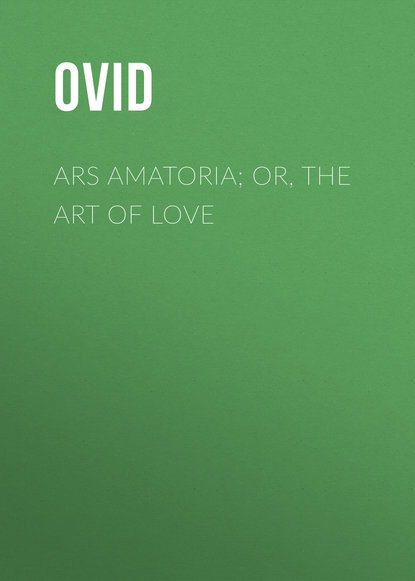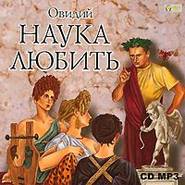По всем вопросам обращайтесь на: info@litportal.ru
(©) 2003-2024.
✖
Ars Amatoria; or, The Art Of Love
Настройки чтения
Размер шрифта
Высота строк
Поля
[ Great must be.—Ver. 417. The meaning is, 'Be careful not to make your first advances on the birthday of your mistress, as that is the time for making presents, and you will certainly be out of pocket.' See the Amores, Book i. El. viii. 1. 94, and the Note.]
772 (return (#x1_x_1_i56))
[ The loosely-clad pedlar.—Ver. 421. Institor' was properly a person who sold wares, and kept a 'taberna' or 'shop' on account of another. Sometimes free persons, but more frequently slaves, were 'institores.']
773 (return (#x1_x_1_i56))
[ A promissory note.—Ver. 428. 'Syngraphus/ or 'syngrapha,' was a 'bill' 'bond,' or 'promissory note,' which was most probably the kind of writing that the pedlar would here require. It may possibly mean a cheque upon his bankers, the 'argentarii' of Rome.]
774 (return (#x1_x_1_i56))
[ Not to have learned.—Ver. 428. The reading here seems to be non didicisse juvat.' 4 It is not to your advantage that you have learned (to write).' The other reading, 'ne didicisse juvet,' may be rendered, '(perhaps) it may be no advantage that you have learned (to write).']
775 (return (#x1_x_1_i56))
[ Birth day cake.—Ver. 429. See the Amores, Book i. El. viii. 1. 94.]
776 (return (#x1_x_1_i56))
[ The jewel.—Ver. 432. For an account of the earrings of the ancients, see the Notes to the Metamorphoses, Book x. 1. 116.]
777 (return (#x1_x_1_i57))
[ Should you give her.—Ver. 447. The meaning of this and the following line is very obscure; so much so that Burmann is in doubt on the subject. It, however, seems to be, that it is not discreet, on first acquaintance, to give presents, as the damsel may then have a reason for peremptoily giving you up; she carries off your gift, and gives no favour in return.]
778 (return (#x1_x_1_i57))
[ Upon an apple.—Ver. 457: See the twentieth and twenty-first Epistles in the present volume.]
779 (return (#x1_x_1_i58))
[ Extend their hands.—Ver. 462. This figure is taken from the gladiatorial games, where the conquered extended their hands in token of submission.]
780 (return (#x1_x_1_i58))
[ Ring of iron.—Ver. 473. The rings worn by the lower classes were of iron.]
781 (return (#x1_x_1_i59))
[ Under some of the columns.1—Ver. 490. The learned Heinsius absolutely thinks that 'columnas' here means 'mile-stones'! It is pretty clear that Ovid alludes to the columns of the Portico; and he seems to say, that the attentive lover, when he sees the damsel at some distance before him, is not to hesitate to escape the crowd by going into the open space outside of the columns, and then running on, for the purpose of overtaking her. See the Tristia, Book iii. El. iii, where he makes mention of the columns in the Portico of the Danaides.]
782 (return (#x1_x_1_i59))
[ Actor is dancing.—Ver. 501. See the Tristia, Book ii. i. 497.]
783 (return (#x1_x_1_i60))
[ With the irons.'—Ver. 505. See the Amores, Book i. El. xiv 1 25, and the Note. The effeminate among the Romans were very fond of having their hair in curls.]
784 (return (#x1_x_1_i60))
[ With the rough pumice.—Ver. 506. Pliny the Elder mentions pumice stone as 'a substance used by women in washing their bodies, and now by men as well.' Persius, in his Fourth Satire, inveighs against this effeminate practice.]
785 (return (#x1_x_1_i60))
[ Bid those do this.—Ver. 507'. He alludes to the Galli, the eunuch priests of Cybele.]
786 (return (#x1_x_1_i60))
[ Hippolytus.—Ver. 511. Phædra, in her Epistle, alludes to his neglect of dress, as one of the merits of Hippolytus.]
787 (return (#x1_x_1_i60))
[ Plain of Mars.—Ver. 513. The Roman youth practised wrestling, and other athletic exercises, on the Campus Martius Being often stripped naked, or nearly so, the oil, combined with t he heat, would tend to bronze the skin.]
788 (return (#x1_x_1_i60))
[ Not be clammy.—Ver. 515. Probably this is the meaning of 'lingua ne rigeat,' although Nisard's French translation has it, 'let your tongue have no roughness.' Dryden's translation is, of course, of no assistance, as it carefully avoids all the difficult passages.]
789 (return (#x1_x_1_i60))
[ The father of the flock.—Ver. 522. He alludes to the rank smell to the arm-pits, which the Romans called by the name 'hircus,' 'a goat,' from a supposed similarity to the strong smell of that animal.]
790 (return (#x1_x_1_i61))
[ Awaking from her sleep.—Ver. 529. See the Epistle of Ariadne to Theseus.]
791 (return (#x1_x_1_i62))
[ Mimallonian females.—Ver. 541. It is a matter of doubt why the Bacchanalian women were called Mimallonides. According to some, they are so called from Mimas, a mountain of Asia Minor, where the rites of Bacchus were celebrated. Suidas says that they are so called, from 'imitation,' because they imitated the actions of men. Bochart thinks that the word is of Hebrew origin, and that they receive their name from 'memelleran,' 'garrulous' or 'noisy'; or else from mamal,' a 'wine- press.']
792 (return (#x1_x_1_i62))
[ Drunken old man.—Ver. 543. See the adventure of Silenus, in the beginning of Book xi. of the Metamorphoses; and in the Fasti, Book iii. 1. 742. He seems to have been always getting into trouble.]
793 (return (#x1_x_1_i63))
[ Cretan Diadem.—Ver. 558. See the Fasti. Book iii. 1. 516.]
794 (return (#x1_x_1_i63))
[ Evie, Evoë!—Ver. 563. In the combat with the Giants, Jupiter is said, when one of them was slain by Bacchus, to have exclaimed 'Well done, son:' whence the exclamation 'Evie!' was said to have originated. See the Metamorchoses, Book iv. 1. 11 and 15, and the Note.]
795 (return (#x1_x_1_i64))
[ On the table.'—Ver. 572. See the Epistle of Paris to Helen; and the Amores, Book i. El. iv. 1. 20, and Book ii. El. v. 1. 17, and the Notes.]
796 (return (#x1_x_1_i64))
772 (return (#x1_x_1_i56))
[ The loosely-clad pedlar.—Ver. 421. Institor' was properly a person who sold wares, and kept a 'taberna' or 'shop' on account of another. Sometimes free persons, but more frequently slaves, were 'institores.']
773 (return (#x1_x_1_i56))
[ A promissory note.—Ver. 428. 'Syngraphus/ or 'syngrapha,' was a 'bill' 'bond,' or 'promissory note,' which was most probably the kind of writing that the pedlar would here require. It may possibly mean a cheque upon his bankers, the 'argentarii' of Rome.]
774 (return (#x1_x_1_i56))
[ Not to have learned.—Ver. 428. The reading here seems to be non didicisse juvat.' 4 It is not to your advantage that you have learned (to write).' The other reading, 'ne didicisse juvet,' may be rendered, '(perhaps) it may be no advantage that you have learned (to write).']
775 (return (#x1_x_1_i56))
[ Birth day cake.—Ver. 429. See the Amores, Book i. El. viii. 1. 94.]
776 (return (#x1_x_1_i56))
[ The jewel.—Ver. 432. For an account of the earrings of the ancients, see the Notes to the Metamorphoses, Book x. 1. 116.]
777 (return (#x1_x_1_i57))
[ Should you give her.—Ver. 447. The meaning of this and the following line is very obscure; so much so that Burmann is in doubt on the subject. It, however, seems to be, that it is not discreet, on first acquaintance, to give presents, as the damsel may then have a reason for peremptoily giving you up; she carries off your gift, and gives no favour in return.]
778 (return (#x1_x_1_i57))
[ Upon an apple.—Ver. 457: See the twentieth and twenty-first Epistles in the present volume.]
779 (return (#x1_x_1_i58))
[ Extend their hands.—Ver. 462. This figure is taken from the gladiatorial games, where the conquered extended their hands in token of submission.]
780 (return (#x1_x_1_i58))
[ Ring of iron.—Ver. 473. The rings worn by the lower classes were of iron.]
781 (return (#x1_x_1_i59))
[ Under some of the columns.1—Ver. 490. The learned Heinsius absolutely thinks that 'columnas' here means 'mile-stones'! It is pretty clear that Ovid alludes to the columns of the Portico; and he seems to say, that the attentive lover, when he sees the damsel at some distance before him, is not to hesitate to escape the crowd by going into the open space outside of the columns, and then running on, for the purpose of overtaking her. See the Tristia, Book iii. El. iii, where he makes mention of the columns in the Portico of the Danaides.]
782 (return (#x1_x_1_i59))
[ Actor is dancing.—Ver. 501. See the Tristia, Book ii. i. 497.]
783 (return (#x1_x_1_i60))
[ With the irons.'—Ver. 505. See the Amores, Book i. El. xiv 1 25, and the Note. The effeminate among the Romans were very fond of having their hair in curls.]
784 (return (#x1_x_1_i60))
[ With the rough pumice.—Ver. 506. Pliny the Elder mentions pumice stone as 'a substance used by women in washing their bodies, and now by men as well.' Persius, in his Fourth Satire, inveighs against this effeminate practice.]
785 (return (#x1_x_1_i60))
[ Bid those do this.—Ver. 507'. He alludes to the Galli, the eunuch priests of Cybele.]
786 (return (#x1_x_1_i60))
[ Hippolytus.—Ver. 511. Phædra, in her Epistle, alludes to his neglect of dress, as one of the merits of Hippolytus.]
787 (return (#x1_x_1_i60))
[ Plain of Mars.—Ver. 513. The Roman youth practised wrestling, and other athletic exercises, on the Campus Martius Being often stripped naked, or nearly so, the oil, combined with t he heat, would tend to bronze the skin.]
788 (return (#x1_x_1_i60))
[ Not be clammy.—Ver. 515. Probably this is the meaning of 'lingua ne rigeat,' although Nisard's French translation has it, 'let your tongue have no roughness.' Dryden's translation is, of course, of no assistance, as it carefully avoids all the difficult passages.]
789 (return (#x1_x_1_i60))
[ The father of the flock.—Ver. 522. He alludes to the rank smell to the arm-pits, which the Romans called by the name 'hircus,' 'a goat,' from a supposed similarity to the strong smell of that animal.]
790 (return (#x1_x_1_i61))
[ Awaking from her sleep.—Ver. 529. See the Epistle of Ariadne to Theseus.]
791 (return (#x1_x_1_i62))
[ Mimallonian females.—Ver. 541. It is a matter of doubt why the Bacchanalian women were called Mimallonides. According to some, they are so called from Mimas, a mountain of Asia Minor, where the rites of Bacchus were celebrated. Suidas says that they are so called, from 'imitation,' because they imitated the actions of men. Bochart thinks that the word is of Hebrew origin, and that they receive their name from 'memelleran,' 'garrulous' or 'noisy'; or else from mamal,' a 'wine- press.']
792 (return (#x1_x_1_i62))
[ Drunken old man.—Ver. 543. See the adventure of Silenus, in the beginning of Book xi. of the Metamorphoses; and in the Fasti, Book iii. 1. 742. He seems to have been always getting into trouble.]
793 (return (#x1_x_1_i63))
[ Cretan Diadem.—Ver. 558. See the Fasti. Book iii. 1. 516.]
794 (return (#x1_x_1_i63))
[ Evie, Evoë!—Ver. 563. In the combat with the Giants, Jupiter is said, when one of them was slain by Bacchus, to have exclaimed 'Well done, son:' whence the exclamation 'Evie!' was said to have originated. See the Metamorchoses, Book iv. 1. 11 and 15, and the Note.]
795 (return (#x1_x_1_i64))
[ On the table.'—Ver. 572. See the Epistle of Paris to Helen; and the Amores, Book i. El. iv. 1. 20, and Book ii. El. v. 1. 17, and the Notes.]
796 (return (#x1_x_1_i64))














